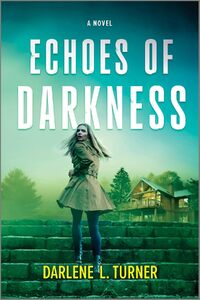 ECHOES OF DARKNESS |
 Fall headfirst into July’s hottest stories—danger, desire, and happily-ever-afters await. |

Purchase
Next Series 32 Romance Series, Romance Chick-Lit Excerpt of The Sunshine Coast News by Kate AustinEach afternoon, crows circled the building like the rings of Saturn or moons of Jupiter. The birds represented another thing which made no sense to Josie, but at least they were consistent and she remained grateful for this minor favor. The world had mostly stopped making sense almost two years ago. It wasn't a single event that had knocked Josie's life askew, but a series of small, seemingly unconnected and random incidents of misfortune. Josie had grown up in a family blessed with good luck. She'd always taken it for granted. Her father, no matter what downturn the economy took and how many of his fellow employees lost theirs, always ended up with a better job than the one he'd started with. Her mother, an avid player of games of chance, never lost money, and when they needed a little extra cash for a vacation, for piano lessons or a new car, she won the jackpot bingo at Our Lady of Perpetual Grace on Friday nights. Fred and Marlene became best friends and lovers the very day they met at the student union during their final year at the University of Toronto. Marlene quit three months short of a degree in Roman history and culture to have Josie and work part-time in telephone sales while Fred finished his accounting course. Even now, Marlene could, and did at Christmas, Thanksgiving and Easter, recite the spiel for: waterless cookware, encyclopedias, half a dozen different magazines, the sharpest knives ever made, a device to peel and core apples with a single touch. Marlene sold them all effortlessly and without regard to their usefulness. She sold them because she knew how a woman felt at three o'clock on a Friday afternoon after a week of cranky kids, dirty laundry and a tired, indifferent husband. She understood the loneliness of an older woman with a voice full of sadness. Not, of course, that any of these things were part of Marlene's life, but they had all been part of her mother's, so her sympathy and patience were boundless. Marlene knew to hang up if a man answered, or a brisk no- nonsense woman, otherwise she listened, spoke words of encouragement and hope, and mostly sold whatever she was selling that month. She thought of these sales as trades — her support and the woman's subsequent sense of at least temporary well-being in exchange for a few dollars for Marlene and her family. The product was irrelevant. In fact, she sold different products to the same women over and over again. To Marlene, and to her customers, it wasn't about the fat- free grill with attached rotisserie large enough for two whole chickens; it was about the conversation. Marlene believed in the value of talk therapy long before it became universally popular. It didn't matter where they lived — and they moved fifteen times before Josie finished high school — Marlene was at the center of a circle of bright, interesting women. Women who talked. Josie learned everything she knew from those women. She knew, without ever having her heart broken, to avoid the boys in tight jeans and T-shirts who hung around in the parking lot after school. She knew to find a good hairdresser and stick with her, no matter how much it cost for a haircut. She knew how to handle difficult bosses, the ones who yelled, the ones who schemed, the ones whose hands landed places they shouldn't. She knew how to make and keep friends, to write letters instead of just e-mails, to phone the minute she thought of it instead of waiting for the right time. She knew to put away a little money for a rainy day, to think before she spoke, to wait for the right man. She learned how to cook and sew, to build bookshelves, to give her car a tune-up. She learned to fix a leaky toilet and knew to clean out the furnace for the winter. Even though she'd never done it, she could tell you how to grow asparagus and transplant lilac bushes. She learned how to deflect a jealous woman's anger, how to recognize a broken heart, how to prevent a child from drowning. She learned how to love a man, and how to be loved in return. She learned to count the stars in the sky, the grains of sand on a beach, the ants in an anthill. She learned about lucky numbers and how to pick a winning horse. Josie grew into adulthood already knowing things some women never learned. The oddest thing about all this knowledge was that once she knew it, and despite the fact that she never used most of it, Josie never forgot it. Those women, their voices, had somehow managed to hardwire her brain with a lifetime's worth of information. Josie saved thousands of dollars because she knew these things. She didn't need to take courses, she could fix her own car and toilet and bicycle, and she never fell in love with a man who would steal her savings. She knew everything except how to handle bad luck. She'd never thought of her life as lucky, after all, she was almost forty and still unmarried. If that didn't constitute bad luck, she had no idea what did. She had friends who'd had two or even three husbands. Josie hadn't found even one. She'd never been engaged, or truly in love. Where was the luck in that? But once her luck changed, she could look back on her life, on her parents' life, and see what had always been perfectly obvious to everyone else. The Harrises were a charmed family. Josie didn't remember being in a single fight, not with Fred, not even with Marlene. She never heard an argument between her parents. Her friends told stories of their vicious teenage knockdown, drag-out battles with their mothers. Josie remembered shopping trips and baking cookies with Marlene, playing Scrabble and Monopoly with Fred and walks in the park with both of them. The only angry words she heard as a child were on television and she knew they had nothing to do with her life. So when bad luck came knocking, Josie was totally unprepared. The first incident might have been a fluke. Josie arrived at Gabrielle's for her regular appointment to find her hair-dresser had eloped with a waiter. Not only that, but he was ten years younger than she was, and handsome and desperately in love. They were moving to Mexico, opening a restaurant and having a baby. Josie learned all this from the man who bought Gabe's shop while he butchered her hair and bitched about Gabe's clients. Josie still hadn't found anyone to replace Gabe, and she'd tried every good and even indifferent salon in the city, so now she settled for ten-dollar haircuts at discount clip joints. She'd forgiven Gabe, even sent a wedding present, quickly followed by a baby gift, but her luck had been swept into the garbage with her hair that day. Josie simply hadn't recognized it at the time. Because it got worse. She got fired from her job, the best job she'd ever had. Not for being incompetent — Josie was smart and punctual and she loved her job (which usually counted for more than intelligence) — or even for an understandable mistake, but for being in the wrong place at the wrong time. Josie's intuition failed her that morning. She knew Don Mollard, knew he wasn't at his best in the mornings, and on the mornings after his five teenage daughters went home to their mother he was impossible. He loved those rowdy girls without a single reservation and couldn't bear to see them go even for a week at a time. So Josie learned to stay out of his way on Friday mornings, to give him time to get used to their absence. Afterwards, she wondered what had gotten into her. She walked into his office without knocking and sat down in the chair across from the desk. She looked at her list and began. "We're meeting with Palleson on Monday. Are the specs ready?" She hadn't even looked at Don before she started talking. If she had, she would have seen the way his cheeks had fallen in on themselves. She would have noticed his red- rimmed eyes and most importantly, for she'd seen and recognized it a hundred times, she would have seen the mark of heartbreak on his face. Josie first saw the mark on Phyllis, her best friend in high school. Josie watched her fall passionately in love with the president of the photography club. Phyllis was tall and slim with beautiful high breasts and the boy took exquisite photographs of the shadows those breasts cast on that perfect body. Art, he'd called it, so Phyllis couldn't object. In those days, at that high school, art was incontrovertible, the highest value. Then he sent the photographs to Playboy and there was Phyllis, naked, in a magazine her father and most of his friends bought every month. For the articles, they said, but Phyllis and everyone else knew that even in the unlikely event they read the articles, they'd still spend most of their time with the pictures. And her face, as well as everything else, was clear for all to see and recognize. She left town to spend the rest of the school year with an aunt but not before Josie saw what had happened to her. Her face changed overnight. It wasn't just sadness, though that was part of it, it was as if the bones had somehow shifted in her skull. They flattened out, leaving great planes of unsupported skin, while at the same time becoming more prominent, so Josie could clearly see the shape of them. No one else noticed anything except the sadness. Only Josie saw the heartbreak and knew Phyllis would never be the same. And she'd learned that the two things — heartbreak and sadness — weren't always equal. Mostly sadness was simply that. A parent dying, a lover lost, sometimes only a tragic book or movie. These engendered sadness. People got over sadness. Only occasionally was the sorrow so overwhelming that it broke a heart. And that's what Josie should have seen on Don's face that Friday morning, what she would have seen if she'd been paying attention. But she'd only learned a couple of months later, long after he'd fired her, why Don's sorrow had turned to heartbreak overnight. She ran into him in her neighborhood coffee shop on a snowy Sunday morning. "Josie," he mumbled. "How are you?" "Fine," she said, grabbing his arm and leading him to a table in the back. "But you're not. What's up?" He raised his face to hers and she gasped. "Don?" His face, once ruddy and unlined, now bore all the signs of disaster. Deep crevices radiated out from his eyes, his nostrils, his mouth, scoring shadows into his sallow skin. He looked as if he hadn't slept since Josie had walked out of his office. "I haven't," he said, reading her mind as if she'd spoken out loud. "Tracy took the girls away. Their cell phones are disconnected, there's no forwarding address and I'm losing my mind worrying about them. I've sold the business, hired detectives, but they've vanished." Josie knew right then that even if Don did find his daughters, he would never be the same man she had known. He'd spend the rest of his life trying to keep those girls safe, never again leaving them to go to work, or allowing them to go to school, instead he'd do whatever it took to keep them in his sight. He had lost them once and he would never let it happen again. So getting fired was her own fault. Don needed to punish someone for the loss of his daughters and Josie was there. Wrong place, wrong time. Sheer stupidity on Josie's part... jinxed by the hair thing. She quickly found another job, even without a reference. The boss was the kind of guy she'd learned about from Marlene's friends. He lied, even about taking the last five dollars out of petty cash, cheated on everything from his wife to his income tax, missed meetings, left jobs unfinished, never told anyone where he was going or when he'd be back. He refused to answer his pager or cell phone. He flirted, outrageously, with any woman who walked through the door, including the staff. Josie spent half her time calming angry clerks, receptionists and bookkeepers, and the other half hiring new ones. In every way, he was the worst man in the world to work for. Excerpt from The Sunshine Coast News by Kate Austin |
|
| |||
|
||||



 © 2003-2025
© 2003-2025